-
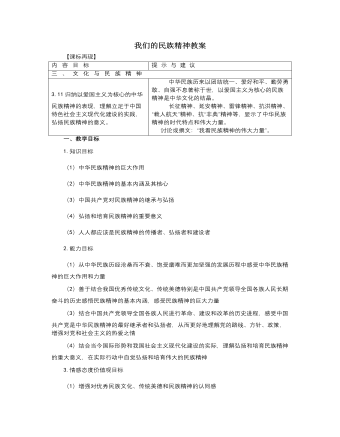
人教版高中政治必修3我们的民族精神教案
2.弘扬和培育中华民族精神,是提高全民族综合素质的必然要求Why:(1)一个民族的发展也取决于民族的综合素质(2)民族精神是民族综合素质的有机组成和集中体现(3)高昂奋进的民族精神能产生巨大的力量,发挥不可估量的作用学生活动:你能举出生活中民族素质有待提高的事例吗?试着分析一下如何解决。举例:南京的市骂、中国公民在国外的随地吐痰、乱扔乱丢现象。3.弘扬和培育中华民族精神,是不断增强我国国际竞争力的要求Why:(1)文化在综合国力的竞争中的地位和作用越来越突出(2)民族精神作为中华文化的精髓,具有凝聚和动员民族力量、展示民族形象的重要功能,已成为表明综合国力强弱的至关重要的因素之一学生活动:“忆一忆”文化在综合国力竞争中具有怎样的意义?(P11、P22,关键词:精神武器、深深熔铸、重要标志、智力支持、方向保证、精神动力)

人教版高中政治必修3世界文化的多样性教案
代中国人民的四大发明,古希腊人的哲学与艺术成就,占代印度人民在宗教和数学方面的成就等,都以其鲜明的民族特色}:富J,世界文化,共同推动了人类社会的进步和发展。总之,尊重和保存不同的民族文化,是人类生存和发展的基础。◇课堂探究:(1)对那些面临失传的占老民族文化,有人反对进行抢救和保护,认为应当顺其自然地让它们被历史淘汰。你同意这种看法吗?(2)你认为,我们还有哪些独特的文化形式可以申报人类口述和非物质遗产?◇探究提示:(1)文化遗产是一个民族的“身份证”,从文化意义上标识出一个民族的个性和一个民族的历史记忆。文化遗产是人类社会发展的见证,是人类文明的重要载体。文化遗产体现着一个民族独特的思维方式和文化价值,是民族的根基,是历史的纪念碑。文化遗产既属于一个国家、一个民族,也是全人类的共同财富。文化遗产具有不可再生性的特点,所以对那些面临失传的古老民族文化,我们不能坐视不管,要进行及时有效地抢救和保护。

新人教版高中英语必修2Unit 3 The Internet-Discovering Useful Structure教案二
This teaching period mainly deals with grammar “The Present Perfect Passive Voice.” To begin with, teachers should lead students to revise what they have learned about the Present Perfect Passive Voice. And then, teachers move on to stress more special cases concerning this grammar。This period carries considerable significance to the cultivation of students’ writing competence and lays a solid foundation for the basic appreciation of language beauty. The teacher is expected to enable students to master this period thoroughly and consolidate the knowledge by doing some exercises. 1. Guide students to review the basic usages of the Present Perfect Passive Voice2. Lead students to learn to use some special cases concerning the Present Perfect Passive Voice flexibly.2. Enable students to use the basic phrases structures flexibly.3. Strengthen students’ great interest in grammar learning.1. Help students to appreciate the function of the Present Perfect Passive Voice in a sentence2. Instruct students to write essays using the proper the Present Perfect Passive Voice.观察下列句子特点,总结共同点。1.(教材P28)Much has been written about the wonders of the World Wide Web.2.(教材P28)But the Internet has done much more for people than simply make life more convenient.3.(教材P28)Many people have been helped by the club.4.(教材P28)She no longer feels lonely, and her company has become quite successful.5.(教材P32)Today I thought I’d blog about a question that has been asked many times—how do you stay safe online and avoid bad experiences on the Internet?

新人教版高中英语必修2Unit 3 The Internet-Listening &Speaking&Talking教案二
From the pictures in the text and the title--- choose the best app, we can know that this part is about how to save money by using apps.Step 2 While-listening1. Laura and Xiao Bo are talking about apps. Listen to their conversation and find out what apps they want.Xiao Bo is looking for a(n) exercise app to help him get in shape.Laura would like an app for getting rich and another that will make her grades better.2. Listen again. Are the sentences true T or false F?1). Both of Xiao Bo's apps keep track of the steps he takes._____2). Xiao Bo's second app can help him make a fitness plan._____3). Laura needs an app that will help her get discounts.______4). Laura needs an app that will add money to her bank account._______F T F T3. Listen once more and tick the sentence you hear. Underline the words used to express predictions, guesses, and beliefs.Predictions, Guesses, and Beliefs________It might help me walk more.________My guess is that it wouldn't work.________I imagine this app would help me get fit faster________I suppose that would be good.________I guess you could save a little with this app.________I suppose there would be some problems, too.________I believe this app could help me get thinner.

新人教版高中英语必修2Unit 3 The Internet-Listening &Speaking&Talking教案一
Listening and Speaking introduces the topic of “ask about online habits”. Many middle school students have been surfing the Internet for many years, but what they do with the Internet and how much time they spend every day may not be very clear to themselves, nor to other students. This section allows students to investigate their peers' Internet use, which is conducive to their mutual understanding and understanding of the Internet. It can also help them reflect on their own online behavior, learn from other people's good online habits, and get rid of their bad online behavior.The listening text of this section is an investigation interview. The investigators interview specific groups with the same questions to obtain information, so as to understand their views, practices or attitudes on this issue. There are two specific questions: “how much time do you spend online every day? What do you usually do online?”. The answers of the three respondents provide rich and different information, and achieve the purpose of the investigators. The oral discourse structure of survey interviews generally includes greeting and explaining the purpose of the interview, presenting the interview questions and the respondents' answers. Listening and Talking introduces the theme of “choosing the right application ". Listening text is a conversation between Laura and Xiao Bo. In this part of listening, “oink”; “piggy bank” may cause the students' hearing comprehension limitation. Oink refers to sound word and pig's sound. So, add some oink to my piggy bank is often used to describe "making a little money".1. Guide students to understand the content of listening texts in terms of listening for definitions.2. Cultivate students' ability to define words and understand an investigation interview.

新人教版高中英语必修2Unit 3 The Internet-Reading and Thinking教案二
Q5:What's Jan's next goal?Her next goal is to start a charity website to raise money for children in poor countries.Q6:What can we learn from her experiences?We learn that when we go through tough times, we can find help and support from other people online. We learn that we can feel less lonelyStep 5: While reading---rethinkingQ1: What is Jan’s attitude to the Internet ?Thankful/Grateful, because it has changed her and her life.Q2: What writing skills is used in the article ?Examples(Jan’s example, the 59-year-old man’s and the 61-year-old woman’s example)Q3: Can you get the main idea of the article ?The Internet has changed Jan’s life/Jan’s life has been changed by the Internet.Step 6 Post reading---Retell the storyMuch has been written about the wonders of the World Wide Web. There are countless articles (1)telling(tell) us how the Internet has made our lives more convenient. But the Internet has done a lot (2)more(much) for people than simply make life more convenient. People’s lives (3) have been changed(change) by online communities and social networks so far. Take Jan for example, who developed a serious illness that made her (4)stuck(stick) at home with only her computer to keep (5)her(she) company. She joined an online group (6)where she could share problems, support and advice with others. She considered the ability to remove the distance between people as one of the greatest (7)benefits(benefit). She was so inspired (8)that she started an IT club in which many people have been helped. She has started to learn more about how to use the Internet to make society better. Her next goal is to start a charity website to raise money (9)for children in poor countries. Jan’s life has been (10)greatly(great) improved by the Internet.

新人教版高中英语必修2Unit 3 The Internet-Reading and Thinking教案一
Paragraph 3. Jan decided to start an IT club to teach old people how to use computers and the Internet. Paragraph 4. Jan has started taking online classes to learn more about how to use the Internet to make society better. Paragraph 5. Jan’s life has been greatly improved by the Internet. Step 5: Critical thinking:(1)How do you arrange your time spent on study and the Internet? Is it reasonable? I usually surf the Internet using my mobile phone for only an hour after class, and it is reasonable for me.(2)What are your online activities? Are they safe? I chat with my friends, read news and play games. I never give away my private information so I think they are safe.Step 4: summary Much has been written about the wonders of the World Wide Web. There are countless articles (1)______(tell) us how the Internet has made our lives more convenient. But the Internet has done a lot (2)_____(much) for people than simply make life more convenient. People’s lives (3) _________________(change) by online communities and social networks so far. Take Jan for example, who developed a serious illness that made her (4)_____(stick) at home with only her computer to keep (5)___(she) company. She joined an online group (6)______ she could share problems, support and advice with others. She considered the ability to remove the distance between people as one of the greatest (7)_______(benefit). She was so inspired (8)____ she started an IT club in which many people have been helped. She has started to learn more about how to use the Internet to make society better. Her next goal is to start a charity website to raise money (9)___ children in poor countries. Jan’s life has been (10)______(great) improved by the Internet. Step 5 Homework:Review what we have learned and find out the key language points in the text.

新人教版高中英语必修2Unit 3 The Internet-Reading for Writing教案二
8. However, the more polite you are, the less likely it is you will be attacked. 然而, 你越有礼貌, 你被攻击的可能性就越小。 Step 8 Writing---the articleHow to stay safe in the online chat roomToday I thought I’d blog about a question that has been asked many times--- how do you stay safe online and avoid bad experiences in the online chat room ? I’m not an expert, but many years as a blogger have taught me a thing or two.First of all, there’s the golden rule of the Internet: keep out of what makes you uneasy. Don’t post comments or click on anything. Second, protect your privacy. Don’t give out too much private information like your address, phone numbers, the ID numbers, etc. Third, be polite. If you are polite to others on the Internet, you won’t be attacked in normal situation. Finally, don’t believe in others easily and never meet someone you met online alone. It is very dangerous.Have you had any bad experiences online, or do you have some good advice for staying safe? Post your comments below!Step 9 Pair workExchange drafts with a partner. Use this checklist to help your partner revise his/her draft.1. Does the writer tell the reader what he/she know about the topic ?2. Are the tips and suggestions well organised ?3. Has the writer defined the new words ?4. Does the author include examples, comparison, or explanations ?5. Does the writer end by asking readers to leave comments and/or suggestions ?6. Can you find any grammar or spelling mistakes.Step 6 HomeworkPut up your revised draft in the classroom or read it to your class.

新人教版高中英语必修2Unit 3 The Internet-Reading For Writing教案一
⑦identity theft 身份盗窃⑧chat room 聊天室⑨draft your blog post 起草博客帖子⑩post embarrassing photos 张贴尴尬照片 【话题句式】 1. How do you stay safe online and avoid bad experiences on the Internet? 你如何在网上保持安全, 避免在网上的不良经历? 2. I’m not an expert, but many years as a blogger have taught me a thing or two. 我不是专家, 但作为一个博主, 我已经学了好几年了。 3. If you see or read something that makes you feel uncomfortable, leave the site immediately. 如果你看到或读到一些让你觉得不舒服的东西, 立即离开这个网站。4. Don’t give out your address or phone number. 别告诉别人你的地址或电话号码。 5. Identity theft is a common and serious problem. 身份盗窃是一个常见而严重的问题。6. Being online is no excuse for being rude, and you don’t want to become a target for a troll or cyberbully. 上网并不是无礼的借口, 你也不想成为发挑衅帖子的人或网络恶霸的目标。 7. Trolls often use several false names so that they can stay on a site. 发挑衅帖子的人经常使用几个假名, 这样他们就可以留在一个网站上。8. However, the more polite you are, the less likely it is you will be attacked. 然而, 你越有礼貌, 你被攻击的可能性就越小。

人教版高中语文必修2《兰亭集序》教案3篇
三、指导第一段的背诵,点拨理解句意,强调关键词语,注重文言基础知识教学。过程中要让学生反复读背。背诵线索:时间——地点——事件——人物——环境——活动——天气——感觉。时间:永和九年,岁在癸丑,暮春之初。地点:会于会稽山阴之兰亭。事件:修稧事也。人物:群贤毕至,少长咸集。环境:此地有崇山峻岭,茂林修竹;又有清流激湍,映带左右。活动:引以为流觞曲水,列坐其次。虽无丝竹管弦之盛,一觞一咏,亦足以畅叙幽情。天气:是日也,天朗气清,惠风和畅。感觉:仰观宇宙之大,俯察品类之盛,所以极视听之娱,信可乐也。四、学生自读背诵5分钟。五、抽一至二名学生试背课文,教师可作必要的线索提示。第二课时一、听名家示范朗诵,学生小声跟读。二、复习巩固第一自然段的阅读背诵。三、朗读、解析第二自然段,理解文章“由叙入感”的写作结构。

人教版高中语文必修3《琵琶行 并序》教案
9、在乐曲终了之后,诗人以“东船西舫悄无言,唯见江心秋月白”两句结尾,这两句作用如何?明确:诗人没有直接写听者的热烈反响以说明琵琶女技艺非凡和乐声的感人至深,否则过于直白就不含蓄,不含蓄也就显不出深沉了。用“东船西舫悄无言”的寂静无声,反衬“有声”的音乐效果,可谓“此时无声胜有声”了。人们无声地沉浸、陶醉在艺术的享受之中,那深深打动人的乐声仿佛缭绕迂回耳际,不由得使诗人想到了自己浩茫的心事,引起情绪上的波澜。在这片刻的沉寂中,只见一轮迷蒙的冷月荡漾在江心的微波之中,它提醒诗人从乐声中回到现实中来。这句景物描写点染烘托了浓重的氛围,与复杂的乐声融为一体,共同表现了琵琶女与诗人息息相通的复杂情感,是那么的忧愤、哀怨凄楚、苍凉,给整个音乐形象补足了画龙点睛之笔。

人教版高中政治必修3世界文化的多样性教案
五、课后反思课后组织学生讨论对本课的感受,同学们都非常乐意采取这种上课方式,既可以通过资料的搜集、整理提高自身信息采集的能力,也能够提高自己学习积极性,变枯燥为生动。本人在教学中也深深地感到:一方面,充分发挥学生的主体作用,有利于启发同学的思维,培养自主思考的能力。而充分利用网络的教学功能,将现代信息技术和学科教学很好地结合了起来。只有调动全体同学的积极性、主动性、创造性,我们的教学才能有生命力;另一方面,光有学生的活动也不行,虽然学生能够积极投入地利用互联网搜集并动手制作课件,在课堂交流中能很好地进行发散思维和创造性思维,但其集中思维和抽象性思维还存在一定的缺陷,主要体现在对搜集的材料的取舍是以及对知识点的归纳和深化方面,所以在充分发挥学生的主体作用的同时应该也必须重视教师主导作用的发挥,引导学生由形象到抽象、由发散到集中、由演绎到归纳的思维能力的逐步提高。

新人教版高中英语必修2Unit 3 The Internet-Discovering Useful Structure教案一
This unit is about the Internet, which has a great influence to our humans and our lives. During the Listening & Speaking & Talking and Reading and Thinking section, the influence in examples has been shown. Thus, use the Present Perfect Tense is appropriate. However, in order to show the justice or weaken the doer of the behavior/action, it’s better to use the Present Perfect Passive Voice than the Present Perfect Tense. Besides, having learned to use the Present Perfect Passive Voice, students can beautify their language in their writing. 1. Learn the structure of the Present Perfect Passive Voice and its functions. 2. Learn to change the sentences with the Present Perfect Passive Voice into the sentences with the Present Perfect Passive Voice. 3. Learn to write sentences with the Present Perfect Passive Voice flexibly according to the context. 1. Learn the structure of the Present Perfect Passive Voice and its functions. 2. Learn to change the sentences with the Present Perfect Passive Voice into the sentences with the Present Perfect Passive Voice. 3. Learn to write sentences with the Present Perfect Passive Voice flexibly according to the context. Step 1 Observe the following sentences, then change the sentences into passive voice.He has been selected to take part in the sports meeting.(肯定句)他已被挑选出来参加运动会。The ink has not been removed from his overcoat.(否定句)墨迹还没有从他外套上去掉。
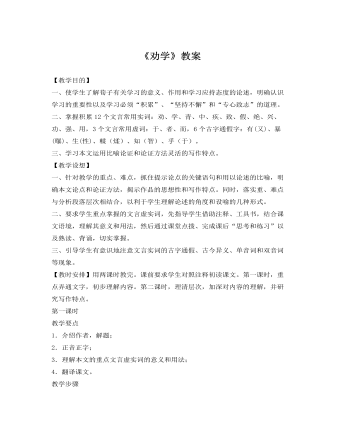
人教版高中语文《劝学》教案
(1)吾尝(曾经)终日而思矣,不如须臾(片刻)之所学也;吾尝肢(踮起脚跟)而望矣,不如登高之博见(看得广)也。(学、思对比,强调了学习的作用;跛望与登高对比,登高的收获大。两例证明利用学习、利用外物的作用。)(2)登高而招(招手),臂非加长也,而见者(看的人)远(远也看得见);顺风而呼(呼喊),声非加疾(快)也,而闻者(听的人)彰(听得更清楚)。(两例证明利用自然条件的作用。)(3)假(借助)舆马者(的人),非利足(快脚)也,而致(达到)千里;假舟楫者,非能水(善游)也,而绝(横渡)江河。(两例证明利用工具的作用。)(4)君子生(性)非异也,善假(利用)于(对)物(外物)也。连用比喻,得出结论:那些有才德的君子,生来本性与普通人没有什么两样(生非异也),只是由于他善于利用学得的知识和本领,善于利用处界条件弥补自身的不足,不断提高自己,所以才成为君子的。
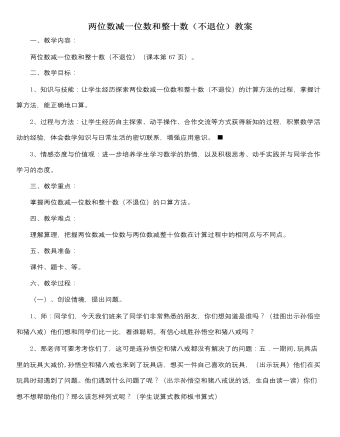
人教版新课标小学数学一年级下册两位数减一位数和整十数(不退位)教案
一、教学内容:两位数减一位数和整十数(不退位)(课本第67页)。二、教学目标:1、知识与技能:让学生经历探索两位数减一位数和整十数(不退位)的计算方法的过程,掌握计算方法,能正确地口算。2、过程与方法:让学生经历自主探索、动手操作、合作交流等方式获得新知的过程,积累数学活动的经验,体会数学知识与日常生活的密切联系,增强应用意识。3、情感态度与价值观:进一步培养学生学习数学的热情,以及积极思考、动手实践并与同学合作学习的态度。三、教学重点:掌握两位数减一位数和整十数(不退位)的口算方法。四、教学难点:理解算理,把握两位数减一位数与两位数减整十位数在计算过程中的相同点与不同点。五、教具准备:课件、题卡、等。六、教学过程:(一)、创设情境,提出问题。
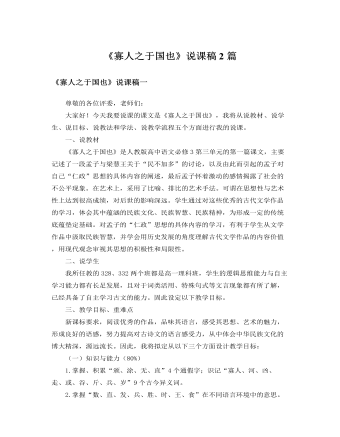
人教版高中语文必修3《寡人之于国也》说课稿2篇
(明确:“寡人之于国也,尽心焉耳矣”,但“寡人之民不加多,何也?”)②他认为自己对国家政务尽心尽力了,他有哪些具体做法?(明确:移民移粟)③第2—4节中孟子是怎样说明梁惠王移民移粟的措施与“邻国之政”并无本质区别的?(明确:孟子不直接回答“民不加多”的问题,而是用梁惠王熟悉的“战”设喻——设圈套,诱使对方在不知不觉中说出“不可,直不百步耳,是亦走也。”)④孟子认为怎样才能做到“王道之始”?要想“王道之成”还需采取哪些措施?(明确:“不违农时,谷不可胜食也。数罟不入氵夸池,鱼鳖不可胜食也。斧斤以时入山林,材木不可胜用也。谷与鱼鳖不可胜食,材木不可胜用五亩之宅,树之以桑,五十者可以衣帛矣。鸡豚狗彘之畜,无失其时,七十者可以食肉矣。百亩之田,勿夺其时,数口之家,可以无饥矣。谨库序之教,申之以孝涕之义,颁白者不负戴于道路矣。)这一小步的目的是想让学生通过这些问题的解答,可以进一步理清思路,掌握文的大概内容。
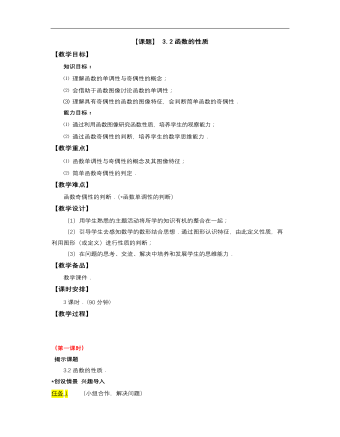
【高教版】中职数学基础模块上册:3.2《函数的性质》优秀教案
【教学目标】知识目标:⑴ 理解函数的单调性与奇偶性的概念;⑵ 会借助于函数图像讨论函数的单调性;⑶理解具有奇偶性的函数的图像特征,会判断简单函数的奇偶性.能力目标:⑴ 通过利用函数图像研究函数性质,培养学生的观察能力;⑵ 通过函数奇偶性的判断,培养学生的数学思维能力.【教学重点】⑴ 函数单调性与奇偶性的概念及其图像特征;⑵ 简单函数奇偶性的判定.【教学难点】函数奇偶性的判断.(*函数单调性的判断)【教学设计】(1)用学生熟悉的主题活动将所学的知识有机的整合在一起;(2)引导学生去感知数学的数形结合思想.通过图形认识特征,由此定义性质,再利用图形(或定义)进行性质的判断;(3)在问题的思考、交流、解决中培养和发展学生的思维能力.【教学备品】教学课件.【课时安排】3课时.(90分钟)【教学过程】
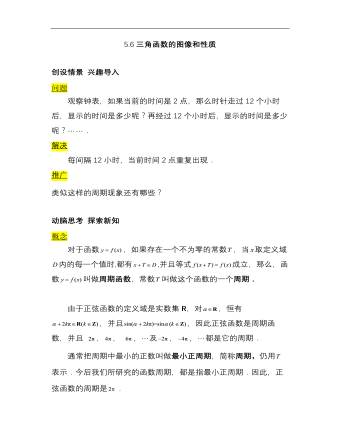
【高教版】中职数学基础模块上册:5.6《三角函数的图像和性质》优秀教案
创设情景 兴趣导入问题 观察钟表,如果当前的时间是2点,那么时针走过12个小时后,显示的时间是多少呢?再经过12个小时后,显示的时间是多少呢?.解决每间隔12小时,当前时间2点重复出现.推广类似这样的周期现象还有哪些? 动脑思考 探索新知概念 对于函数,如果存在一个不为零的常数,当取定义域内的每一个值时,都有,并且等式成立,那么,函数叫做周期函数,常数叫做这个函数的一个周期. 由于正弦函数的定义域是实数集R,对,恒有,并且,因此正弦函数是周期函数,并且 ,, ,及,,都是它的周期.通常把周期中最小的正数叫做最小正周期,简称周期,仍用表示.今后我们所研究的函数周期,都是指最小正周期.因此,正弦函数的周期是.
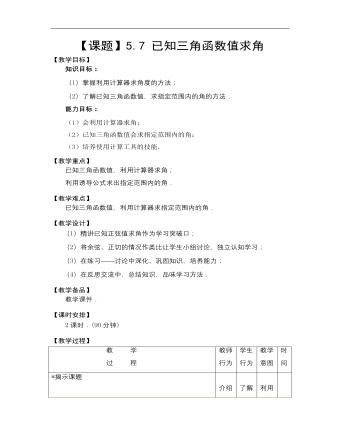
【高教版】中职数学基础模块上册:5.7《已知三角函数值求角》优秀教案
【教学目标】知识目标:(1)掌握利用计算器求角度的方法;(2)了解已知三角函数值,求指定范围内的角的方法.能力目标:(1)会利用计算器求角;(2)已知三角函数值会求指定范围内的角;(3)培养使用计算工具的技能.【教学重点】已知三角函数值,利用计算器求角;利用诱导公式求出指定范围内的角.【教学难点】已知三角函数值,利用计算器求指定范围内的角.【教学设计】(1)精讲已知正弦值求角作为学习突破口;(2)将余弦、正切的情况作类比让学生小组讨论,独立认知学习;(3)在练习——讨论中深化、巩固知识,培养能力;(4)在反思交流中,总结知识,品味学习方法.【教学备品】教学课件.【课时安排】2课时.(90分钟)【教学过程】 教 学 过 程教师 行为学生 行为教学 意图时间 *揭示课题 5.7已知三角函数值求角 *构建问题探寻解决 问题 已知一个角,利用计算器可以求出它的三角函数值, 利用计算器,求= (精确到0.0001): 反过来,已知一个角的三角函数值,如何求出相应的角? 解决 准备计算器.观察计算器上的按键并阅读相关的使用说明书.小组内总结学习已知三角函数值,利用计算器求出相应的角的方法. 利用计算器求出x:,则x= 归纳 计算器的标准设定中,已知正弦函数值,只能显示出?90°~ 90°(或)之间的角. 介绍 质疑 提问 引导 说明 了解 思考 动手 操作 探究 利用 问题 引起 学生 的好 奇心 并激 发其 独立 寻求 计算 器操 作的 欲望 10
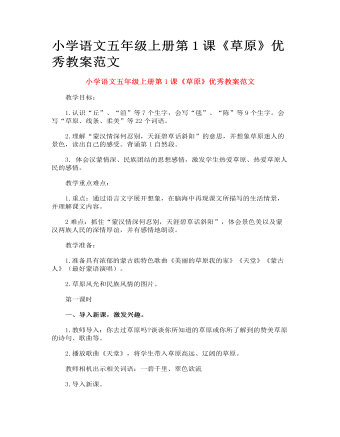
小学语文五年级上册第1课《草原》优秀教案范文
初读课文,学习字词。 1.提出读书要求:默读课文,一边读一边画出不认识的字和不理解的词,并借助词典等学习工具书理解。 2.教师检查学生学习情况。 (1)检查生字读音。 小丘( qiū)渲染(xuàn )迂回( yū)蒙古包( měng ) 襟飘带舞( jīn )鄂温克(è) (2)指导易混淆的字。 “襟”是左右结构,左边是“衤”,与衣服有关,表示衣服胸前的部分。 “涩”是左右结构,右边下面是“止”,不能写成“上”。 “裳”下面是“衣”,与衣服有关。 “微”:中间部分不能少一横。 (3)理解较难的词语。 ①联系上下文理解词语。 草原上行车十分洒脱,只要方向不错,怎么走都可以。 “洒脱”的意思是:潇洒自然,不拘束。这个词语反映了草原的广阔无边。 ②理解“襟飘带舞”一词的意思,可以出示蒙古族鲜艳的服装来分析,意思是:衣襟和裙带随风舞动。 ③“翠色欲流”一词可以从难字入手理解,比如“欲”在这里表示“将要”的意思,“翠色欲流”就是绿得太浓了,将要流下来,写出了草原的绿,是充满生命力的。 ④鄂温克:我国少数民族之一,聚居在内蒙古自治区的东北部。

